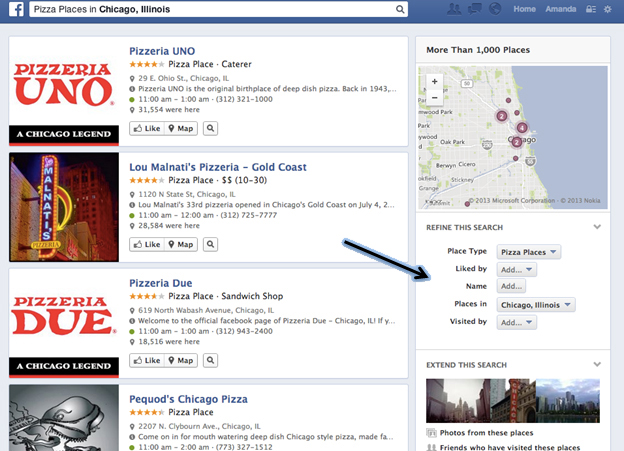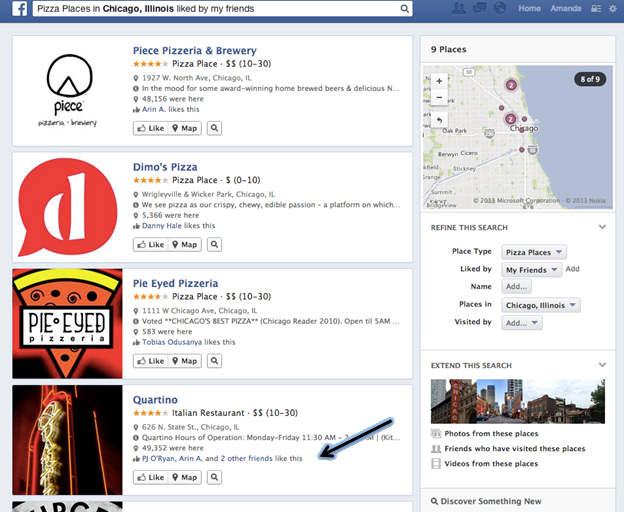
With over 1 billion active users as of this year, Facebook is no doubt the social network to master for marketers. However, for most company Facebook accounts, the focus isn’t generally on the number of “likes” or “fans” earned. While a Facebook “like” shows engagement, it’s the great content and the advertising opportunities that typically take the top spot on the priority list. Fortunately, these little numbers are beginning to hold real value thanks to the introduction of the Facebook Graph Search.
In the past, marketers haven’t been able to put a real value on the like or the fan because there are so many different reasons someone might become a fan of your page—you can never quite know why that fan appeared. Now that the Facebook Graph Search has expanded Facebook as a search engine for businesses (as opposed to just a social network), it’s those fans and those likes that are going to get your company to the top of a search. It’s a strategy-changer, and one that’s only going to get more important as Facebook continues to develop.
The Extras: The Value of a Like Pre-Facebook Graph Search
It’s always best to understand your audience and user intentions, and going back to before the Graph Search is a good way to get a look at the whole picture. Below are a few reasons someone might become a fan of your page or “like” your page even without the Graph Search:
- They were in contact with you once.
- They like the company because their friends like the company.
- They might think they will need your company someday (although they’ll typically forget)
- They want to have it listed on their profile that they like you whether for popularity reasons, because they want a lot of likes, etc.
- They want a free, one-time coupon or some sort of Farmville dollars.
- They are actually interested in your content and learning something from what you offer.
[/list]
Before the introduction of the Facebook Graph, these were the typical reasons a company would earn a fan. As you can see, not all seem overly valuable on the surface, so it was tough to measure whether or not your number of fans (or likes) really mattered. Even the Facebook analytics don’t tell you how many of your fans are actually engaging with your posts.
How the Facebook Graph Search Improved the Value of a Facebook Like
Facebook Graph Search was introduced in January of this year as a way to really utilize the information Facebook has about companies based on what friends across the network are engaging with (“likes” being one of the ways you can engage). In other words, it opens up the search functionality of the social network to be more than simply searching for others users. Now, Facebook is finding similarities and other connections between friends and allowing you to search based on those similarities. Consider the following screenshot:

At first, it’s just a page that comes up with common pizza places in Chicago. However, you can see that there is now a little section that allows you to refine your search. If you’d like, you can change the results to say “Liked by My Friends.” This changes the search results completely. As you can see in the screenshot below, just by choosing this little drop down menu, I am getting a list of new pizza places that my friends have liked in the past (and I can even see what friends):

There is also an “extend this search” section where you can click “Friends who have visited these places.”
So What’s the Actual Value of a Facebook Like?
The more likes you have, the more people who will have connections, the more likely you are to show up in the Facebook Graph search. Therefore, the value of a Facebook like now has an entire new layer of worth. It’s no longer just about hopefully popping up in someone’s newsfeed—it’s not about popping up in a search. Unfortunately, there have been no numbers released that tell us just how many people are using Facebook out of its 1 billion users. Let’s look at it this way by using very safe estimates:
- Let’s say just ¼ of Facebook users use this feature to be on the very safe side.
- If you have 1,000 people who have liked your page, and each one of those 1,000 fans have 100 friends (also a safe estimate), then that means that 25 of those friends are using the Facebook Graph Search.
- It then means that of those 25 people, you’re likely to show up on a Search Engine Results page 25X1000
- This equals 25,000 more times your company will show up on Facebook.
[/list]
It’s relative how valuable you found your links in the first place, but it’s safe to say that the value has definitely gone up. It’s also worth pointing out that this number should only increase as the popularity of the Facebook Graph Search increases. So what’s the moral of the story? While it’s unclear the exact worth of a Facebook like, it’s clearly increasing and becoming more influential.
What Others Have to Prove about This Theory
Danny Sullivan of Search Engine Land touched on this idea back in January when he discussed some of the problems and some of the benefits of this new way to search. One of the biggest problems he saw that Facebook is dealing with right at the forefront is this idea that people didn’t always “like” the Facebook pages of businesses they, well, like. You might have an awesome painter in your area, but that doesn’t mean you go to Facebook and “like” that page, and people know that. However according to Sullivan’s article, Tom Stocky of Facebook stated “there are now new reasons to make these connections. We’re hoping the existence of that will encourage it.” The start of this new search will be able getting businesses to create Facebook pages, then getting people to really engage with company business pages, and finally the actual search.
So, want to see all the TV shows that are liked by software engineers, as an example of that type of general search? “I wouldn’t normally think to search for this anywhere else,” Stocky said, offering up yet another example of what the new Facebook Graph Search promises.
No, you wouldn’t, because until now, there really was nowhere else to search for that type of thing. That’s the uniqueness that Facebook brings into the search game today. These “likes” are like your Google links—these are what drive the Facebook algorithm and help you show up on that Facebook SERP, and although it will take some time before people catch on, the idea is completely unique.
Steps to Increasing Your Facebook Likes
Below are a few quick ways to try and increase your number of “likes” and “fans:”
- Facebook Widgets.
- Facebook like exchanges (this is a great way to connect with other blogs in the community and hopefully you will share each others content and put that content in front of the eyes of a new audience. This works best with complimentary companies).
- Promote your Facebook page so that it is recommended for people to like.
- Add to your email signature.
- Incorporate the Facebook comment feature.
- Take photos if you have an event and have people tag themselves.
[/list]
A Facebook like is valuable, and it’s becoming more valuable. Once you earn a Facebook like, then it is your time to produce great content and keep that like engaged and hopefully bring that person to your website. Your job isn’t over when you’ve earned the like, but you’re off to a good start.
Dan Petrovic, the managing director of DEJAN, is Australia’s best-known name in the field of search engine optimisation. Dan is a web author, innovator and a highly regarded search industry event speaker.
ORCID iD: https://orcid.org/0000-0002-6886-3211

Hey Amanda
I agree with you wholehartedly that FB like are becoming much more valueble for secect business types and situations.
I have personally seen companies that only exist and sell via FB likes and social sharing and companies which stuggle to make a single sale on Facbeook at all.
These new features are a great tool for detereminig how your business can levelrage Facebook to create better profits or better results on SERPs. Sometimes in a particular industry its not really possible to sell via Fb or to even promote yourself on the FB search option, but then you could leverage the platform to get more social signals for your articles or content which in turn would make them rank higher in serach engines and bring in mre traffic that way.
Social media can and will always play a part in SERPs and driving traffic and making sales – we just have to get creative and innovative in how to use these new features.
Paul Back
That’s really amazing information shared. I think we better engaging over post and gaining more fans to your business will help you to grow your business.
Dan mate, you might want to check Amanda’s url in her BIO. Its missing a “w”, and erroring out.